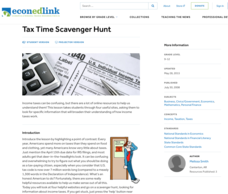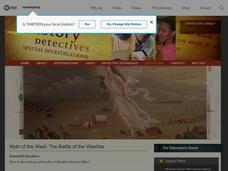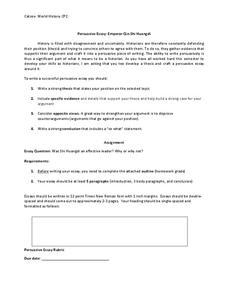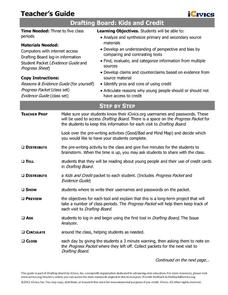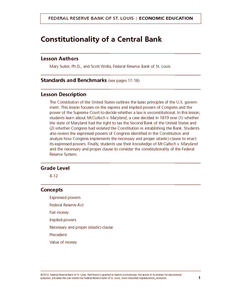Council for Economic Education
Tax Time Scavenger Hunt
Is a 1040EZ tax form really easy? Scholars investigate the complexities of the United States taxation system with an economics lesson. Using a wide variety of web sources, they interpret IRS taxation rules and regulations to better...
Kenan Fellows
Assembly Required and the Design Process Too!
Do your part to make manufacturing more manageable. A capstone project challenges each group to identify and research a manufacturing process for a product. To complete the activity, they create a presentation for business and community...
Kenan Fellows
An Analytical Chemist, a Biochemist, an Animal Scientist, and an Oncologist Walk into a Lab...No Joke
Oncology presents multiple opportunities for research and the collaboration of many different types of scientists. Scholars divide into groups and research the history of mass spectrometry, polarity/non-polarity,...
University of California
The Vietnam War (1945 – 1975)
Have you ever wanted to do something so perfectly you wound up not doing it well at all? Young historians use primary and secondary documents to analyze the United States involvement in the Vietnam War. The issues surrounding the...
PBS
Myth of the West: The Battle of the Washita
Go West, young man! Scholars use PBS video clips, slide shows, and interactive materials to create a picture of Manifest Destiny in the American West. Using a variety of primary and secondary sources, young historians learn about the...
National Endowment for the Humanities
Lesson 4 James Madison: Internal Improvements Balancing Act—Federal/State and Executive/Legislative
Who has the power? The founding fathers asked the same question when the United States was formed. Learners explore issues that arose during Madison’s presidency that raised constitutional questions. Through discovery, discussion, and...
Henry Ford Museum
Sustainability: Environmental Management and Responsible Manufacturing
When you think about environmental sustainability, the Ford Motor Company probably isn't the first company to come to mind. A four-lesson unit introduces learners to the idea of sustainability and environmental stewardship. It describes...
Library of Congress
Thomas Jefferson's Library: Making the Case for a National Library
The United States Library of Congress, the largest library in the world. But such was not always the case. The library was destroyed during the War of 1812. In a persuasive letter to Samuel H. Smith, Thomas Jefferson offered to sell his...
PBS
Evolution of the Presidency: Theodore Roosevelt to Franklin D. Roosevelt
How much power should a president be allowed to exert? Theodore Roosevelt and Franklin D. Roosevelt exercised their power according to their interpretations of the United States Constitution, and these interpretations affected the...
Cuba_Student_Learning_Outcomes (2016)
A summary of the Cuba War and Peace unit, including Essential Questions and recommended texts.
Vietnam War and Peace: Essential Questions (2016)
Students will understand the key geopolitical and internal dynamics shaping Vietnam’s history 1956-1963.
Cuba War and Peace: Lecture II 1952 to 2015
Students consider the causes and consequences of the Cuban Revolution, including the Batista regime, independence movements of Latin America and Cold War geopolitics. Particular attention is paid to the Eisenhower, Castro, Khrushchev and...
Cuba War and Peace: Lecture I Pre-History to 1952
Students will understand the key geopolitical, historical, social and internal dynamics of U.S-Cuba relations, Pre-history to 1952. Learners evaluate the role of geography, imperialism, slavery, island ethnicity, resources and power,...
Cuba War and Peace: Essential Questions (2016)
Students (grades 8-12+) will understand the key geopolitical, historical, social and internal dynamics of U.S-Cuba relations, 1895-present. Learners evaluate the role of geography, imperialism, slavery, island ethnicity, resources and...
Curated OER
Persuasive Essay
Next time you assign your young historians to write a persuasive essay, use this document as a starting point and support them with a rubric, tips for writing a successful persuasive piece, and a general essay outline.
Federal Reserve Bank
Savvy Savers
What are the benefits and risks of saving in an interest-bearing account? Pupils explore concepts like risk-reward relationship and the rule of 72, as well as practice calculating compound interest, developing important personal finance...
City University of New York
Dutch New York
What patterns appear in the treatment of Jewish and Quaker immigrations to New Netherland? Your class members will work together to read and discuss the religious restrictions placed on immigrants to Dutch New York.
iCivics
Drafting Board: Community Service
Should schools impose community service graduation requirements? In the final lesson of the Drafting Board series, learners solidify their practice of crafting an argument supported by sound reason and evidence.
iCivics
Drafting Board: Electoral College
Should the president of the United States be voted by the Electoral College or the popular vote? Your young historians will consider the pros and cons of the Electoral College, and make an argument using reasons and evidence provided in...
iCivics
Drafting Board: Kids and Credit
Should kids under the age of 18 be given access to credit cards? Learners identify pros and cons of using credit, develop claims based on evidence, and finally argue reasons for or against credit for minors.
iCivics
Drafting Board: Military Intervention
Should countries use their militaries to stop humanitarian crises in other countries? Learners make claims, organize their reasoning, and provide evidence for their arguments with this rich resource.
iCivics
Drafting Board: Interest Groups
Does the influence of interest groups harm a political system? Your class members will analyze the role of interest groups in American politics, as well as consider the effect of perspective, bias, loyalty, and the First Amendment.
Speak Truth to Power
Jamie Nabozny: Bullying: Language, Literature and Life
Class members identify bullying in contemporary texts and role play how they might change those scenes to examples of anti-bullying. They then re-define their initial definitions of bullying and discuss what they would like to see as...
Federal Reserve Bank
Constitutionality of a Central Bank
Considering the expressed and implied powers of Congress, was it constitutional for the United States to establish the Second National Bank in the early nineteenth century? What is the constitutionality of the Federal Reserve System?


